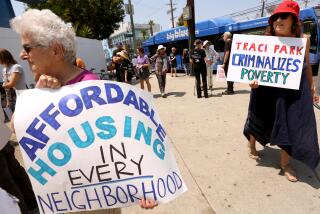ACLU’s victory is a loss for skid row
- Share via
IMAGINE THAT HUNDREDS -- no, thousands -- of people were sleeping on the streets and sidewalks of your community every night, making it nearly impossible to walk to school or to work without being exposed to drug use, threatening behavior and other unthinkable conditions. Wouldn’t you want those people to be moved immediately or risk being arrested? You bet you would.
But in downtown L.A., it’s not that simple. When police began trying to enforce the law in skid row, the American Civil Liberties Union became outraged and sued the city, arguing that people have a right to sleep on the street.
The ACLU sued despite the fact that this city has financed thousands of new shelter beds in the last five years and opened thousands of permanent, supportive housing units for people with extremely low incomes. It sued despite the fact that this city is the dumping ground for most of the other municipalities in and around the county.
And it sued despite the fact that the neighborhood is working hard, with the help of the Los Angeles Police Department, to establish a sense of normalcy and to discourage behavior that would be intolerable anywhere else.
Sounds like a nutty lawsuit, right? But last week, the U.S. 9th Circuit Court of Appeals agreed with the ACLU, ruling that the police cannot arrest people for sleeping or sitting on public sidewalks of skid row because it would violate the 8th Amendment’s prohibition on cruel and unusual punishment. It’s cruel and unusual, the court reasoned, because there are not enough shelter beds for every one of the more than 11,000 homeless people who live in the area.
Does that make sense? What about the fact that two-thirds of our region’s cities do not even allow shelters -- in violation of state law -- and that as a direct result, homeless people from all over are dumped on skid row?
What about the fact that many of the homeless still on the street on skid row refuse shelter for the night because they do not wish to (or are not able to) abide by the rules -- including not using illegal substances or alcohol? Or that the streets of skid row at night become a free-for-all, a market for illegal and bizarre behavior that most people cannot begin to imagine?
And what about the fact that no one is arrested by the LAPD before being offered a bed for the night at a local shelter? Or that people may be taken into custody for their own protection from an environment that is dangerous and where the most common crime is transient-on-transient assault?
It’s time for us to get real. We all have a responsibility to help the most unfortunate among us, and we all must step forward. But why penalize the city of Los Angeles? Why demoralize a neighborhood that is struggling to improve? Indeed, skid row already has become a place where thousands of formerly homeless and drug-addicted individuals now live stable lives alongside hundreds of working families, veterans, businesses and about 700 children.
ANYONE WHO TRULY cares about the homeless will not rejoice in the court’s decision. Law enforcement is not the problem. The LAPD has never swept the streets of downtown Los Angeles clear of the homeless, nor has it tried. But some attempt to restore order is necessary. For years, the anything-goes attitude toward skid row has created a culture of lawlessness in which many people (mostly African Americans) have died.
The 9th Circuit’s decision will only reinforce the view of law enforcement authorities and mental health officials from outside Los Angeles that public drunks, drug users, homeless people and those suffering from mental illness belong not in their city, but in downtown L.A.
The city of Los Angeles cannot be held accountable by itself for housing the county’s entire homeless population of 88,000. The whole region needs to step up. The city of Los Angeles will always bear the lion’s share of the responsibility for providing housing and homeless services. But we can’t do it all.
More to Read
Sign up for Essential California
The most important California stories and recommendations in your inbox every morning.
You may occasionally receive promotional content from the Los Angeles Times.










